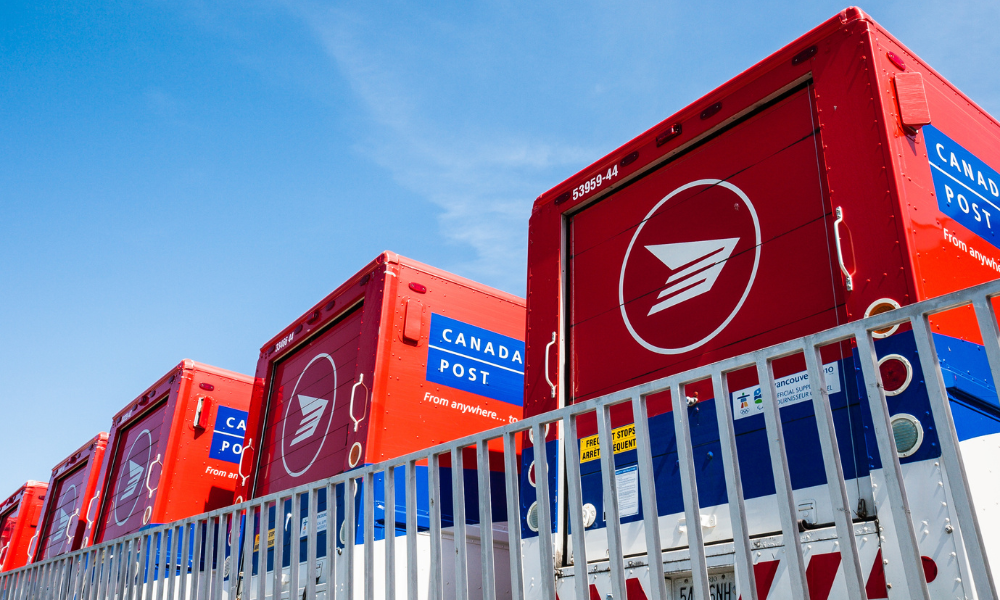Canada Post prepares new proposals as workers await bargaining update one week before legal strike

Canada Post has paused contract talks with the Canadian Union of Postal Workers (CUPW), telling employees it is taking a “temporary pause” from negotiations.
The union described the decision as “reprehensible,” warning it comes just over a week before postal workers could lawfully return to the picket line, The Globe and Mail reported.
In a Tuesday statement, the Crown corporation said talks had failed to produce “meaningful progress” and that the pause would allow it to prepare “comprehensive proposals aimed at moving discussions forward constructively.”
The union said Canada Post had not offered any dates for when the new proposals would be shared.
“Given the seriousness of the matter, it is reprehensible to keep workers and the public on edge when we should all be focused on negotiating good collective agreements that will benefit workers and grow our public service to meet the needs of all Canadians,” CUPW wrote in its response.
The two parties have been bargaining for more than a year over issues such as wages and staffing requirements for a seven-day delivery schedule.
After talks collapsed in March, negotiations resumed in April with the help of a mediator, according to a release from Canada Post last month.
However, the corporation said on Tuesday that “the union has either held or hardened its previous positions on key issues, leaving little room for progress.”
CUPW said Canada Post “has refused to take responsibility for the financial situation it finds itself in.”
The union also said Canada Post ignored a proposal to implement weekend delivery using existing language in the collective agreement.
More than 55,000 postal workers went on strike for 32 days in November and December last year, disrupting mail and parcel delivery during the peak holiday season.
The federal government responded by instructing the Canada Industrial Relations Board to order the workers back and extend their contract until May 22.
With that deadline fast approaching, no new deal has been reached. After May 22, postal workers could legally strike again.
Canada Post has experienced years of financial strain, reporting cumulative losses of at least $3bn since 2018 due to a decline in letter mail volume.
In January, the federal government issued a $1.034bn loan to support operations in 2024.
In its most recent annual report, the corporation projected it will need “at least $1bn” each year beginning in 2026 to keep operations running and meet employee obligations.
The previous strike caused mail disruptions across the country, delaying everything from parcels to passports for weeks.
Canada Post handled an average of 8.5 million letters and 1.1 million parcels per weekday in 2023, representing about 29 percent of the parcel delivery market.
A renewed strike would affect consumers and thousands of small businesses, while also straining a fragile shipping sector already dealing with supply chain issues, US tariffs, and economic uncertainty.
In December, the federal labour relations board ordered the workers back after a request by then-labour minister Steve MacKinnon.
The board also launched an industrial inquiry commission to examine the persistent failure of contract negotiations.
Labour negotiator and former University of Ottawa law professor William Kaplan is leading the commission and is expected to submit his findings on May 15.
CUPW said it expects Canada Post to present its new proposals “immediately” following the release of Kaplan’s report.
Stephanie Ross, an associate professor of labour studies at McMaster University, said the pause in bargaining is “clearly related” to the upcoming report.
“Canada Post is hoping that they may see something in that report that may give them additional leverage,” Ross said.
She added that by delaying talks to May, Canada Post has weakened the union’s ability to apply pressure.
“The annual rhythms of when Canadians use the postal service coincide with Christmas. It’s when they can apply maximum pressure,” she said.
Delaying the dispute until May, she noted, places it “at a time when the union has less leverage.”
Ross said the outcome of the contract talks will impact Canadians broadly. “Lots of people around the country are facing layoffs because of the uncertainty with tariffs,” she said.



